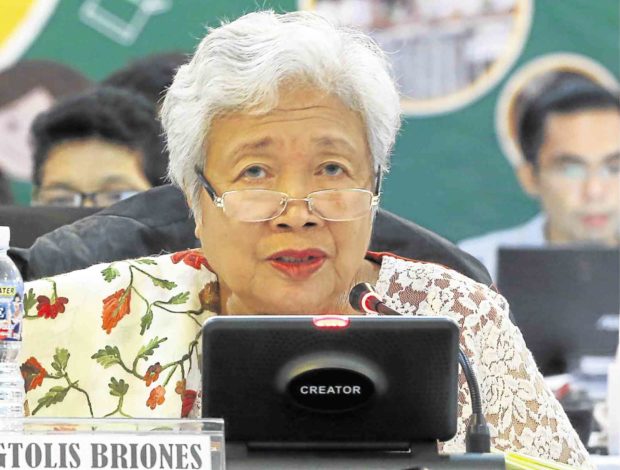Not ‘Kuri-kulam’ but ‘Cure-iculum’

Education Secretary Leonor Briones —INQUIRER PHOTO
To ascribe Ferdinand “Bongbong” Marcos Jr.’s almost-win in the 2016 vice presidential race to the K-to-12 basic education curriculum is to have a myopic view of — or worse, to ignore — other social conditions besetting our country.
In his opinion piece “Kuri-kulam,” published on Sept. 17, Antonio Calipjo Go’s assertions of “collective and concerted reluctance and outright refusal to acknowledge and include in textbooks the truth about martial law under [Ferdinand] Marcos [Sr.] … ” are nowhere near the truth and are contrary to the Department of Education’s (DepEd) consistent emphasis and articulation in the curriculum of the primacy of human rights.
The DepEd also believes in the importance of teaching Philippine history as a crucial bedrock of the Filipinos’ journey as a nation, and in the inclusion of different social issues that enables learners to understand their role as Filipinos, members of the Association of Southeast Asian Nations and citizens of the world.
Even before learners enter high school, Grade 6 students already have a Philippine History subject as a major part of Araling Panlipunan (AP). But concepts related to martial law are spread out in the entire AP curriculum, with lessons anchored on the curriculum guide and clearly articulated in learning competencies that allow learners to examine the events that led to martial law and its impact on the politics, livelihood, and lifestyle of Filipinos.
‘Naturally integrated’
Article continues after this advertisementWhile Philippine history, as a subject, is no longer part of the junior high school curriculum, discussions of events in Philippine history, especially on martial law, are “naturally integrated” in several subjects, among them Southeast Asian political landscape in the fourth quarter of Grade 7, and contemporary politics of Asia in Asian history (also taught in Grade 7), which focuses on the rise of dictatorship in Southeast Asia, e.g. Suharto and Sukarno of Indonesia, Lee Kuan Yew of Singapore, and Marcos of the Philippines.
Article continues after this advertisementHowever, it must be emphasized that even prior to the implementation of K-to-12, discussions on the dynamics of martial law had been an essential part of the Philippine history course taught among first year high school students.
The curriculum is the work of several experts in social science. It is most unfortunate that Mr. Go repeatedly declined several invitations to be part of the curriculum guide exercise.
The titles cited in Mr. Go’s opinion piece which had erroneous information on martial law are not DepEd textbooks. These are published by private publishers and used by private schools. While the DepEd does not currently prescribe the type or title of textbooks that private schools may use, it is high time that the department does so, consistent with Section 4, Article 14 of the Constitution which provides that “the state … shall exercise reasonable supervision and regulation of all educational institutions”—including the type of books or reading materials used in private schools.
Culture-based
The department emphasizes that there is no concerted plan to sanitize, trivialize and ignore the evils of martial law. To do so would run counter to its mandate to protect and promote the right of every Filipino to quality, equitable, culture-based and complete basic education.
The concepts of love of country, nationalism and patriotism, and “the long and arduous journey our forefathers took to get us to where we are” are all included in the K-to-12 curriculum. To blame the curriculum for the noninclusion of these concepts in private publishing companies’ textbooks is to engage in a non sequitur argument. Mr. Go may scan the contents and competencies written in the K-to-12 curriculum guide to find what he is looking for.
Mr. Go’s recommendations on the contents of Araling Panlipunan are already included in the curriculum, with the following as focus per grade level:
Kindergarten – “Ako at ang Aking Kapwa”
Grade 1 – “Ako at ang Aking Pamilya at Pamahalaan”
Grade 2 – “Ang Aking Komunidad Noon at Ngayon”
Grade 3 – “Ang mga Lalawigan sa Aking Rehiyon”
Grade 4 – “Ang Bansang Pilipinas”
Grade 5 – “Pagbuo ng Pilipinas Bilang Nasyon”
Grade 6 – “Mga Hamon at Tugon sa Pagkabansa”
Grade 7 – “Araling Asyano”
Grade 8 – “Kasaysayan ng Daigdig”
Grade 9 – “Ekonomiks”
Grade 10 – “Mga Kontemporaryong Isyu”
As previously clarified, the DepEd has included several social issues, such as human rights and martial law, in the curriculum. More than any other institution or agency, it is the DepEd that has great influence in helping Filipino learners remember and celebrate what great things our forebears have done, and consequently, in emphasizing the evils that men have done so that these will not be repeated.